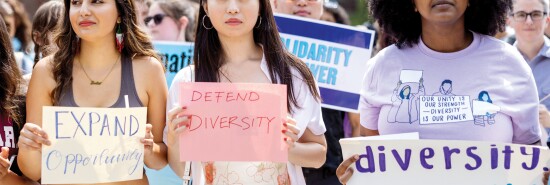
Want to promote diversity, equity, and inclusion? Embrace meritocracy
Jack Miller | Jack Miller Center
Video Embed
In 2020, many American corporations and academic institutions adopted new policies to promote “diversity, equity, and inclusion” (DEI). Among these, Boston University decided to build an “anti-racist” research center around activist Ibram X. Kendi. Now, however, Kendi and his center are under fire for mismanaging resources and failing to deliver on the racial reconciliation they promised.
Diversity, equity, and inclusion are all laudable virtues– unfortunately, though, Kendi’s ideology fails to live up to these high ideals. In his book “How to be An Anti-Racist,” for instance, Kendi offers the nonsensical statement that, “The only remedy to past discrimination is present discrimination.” That is not what America is about.
Achieving true diversity, equity, and inclusion starts with recognizing we are all individuals first. Instead of assigning collective guilt or praise to arbitrary groups, we need to recognize the promise of the Declaration of Independence. We are all, as that document says, “created equal,” not in some physical or other attributes way, but with “certain unalienable Rights, that among these are Life, Liberty and the pursuit of Happiness.”
America is a very diverse nation. Every age, gender, race, ethnicity, sexual orientation, religion, nationality, and socio-economic background is represented in this country. This contributes to a rich tapestry of perspectives and experiences. Genuine diversity means celebrating these differences, not trying to homogenize individuals into group identities that claim a special “oppressed” status.
We are also a nation striving for equity for all, which means focusing on the principles of fairness and justice for all. America is built not on the false promise of equal outcomes, but on the notion that everyone is owed an equal opportunity to succeed. We haven’t fully achieved this goal, but we are getting ever closer.
And the same applies to “inclusion,” the concept that we have a society where “all individuals, regardless of their background, characteristics or differences are treated with respect, fairness and equity and are provided with equal opportunities.”
Diversity, equity, and inclusion are virtues that should spark a powerful movement to unify Americans. We should insist that we, as a nation, live up to those rights that we are guaranteed. DEI should not be a movement that tears us apart, but rather a movement that unites us as Americans.
Our Declaration goes on to state that since we are all equal, we all are guaranteed our life and our liberty. But what about that last guarantee, the guarantee of, “the pursuit of happiness?” Notice that it does not guarantee happiness – only the “pursuit” of happiness.
In America it is up to each individual, based on their own abilities and their own efforts, to achieve their own happiness. This is what is meant by meritocracy, the notion that we can each rise into success according to our abilities and hard work. To make all this a reality, everyone should have as equal a place at the starting line as possible. And the best way of assuring that is by giving everyone the best education possible. So, where do we start?
Since over two thirds of high school graduates do not go to college, and many who do go drop out, the obvious place to start is in the K-12 system. Everyone should receive a great education in reading, math and other basics. Everyone should also learn what has made America “the land of the free” where living “the American Dream” is possible for all in their “pursuit of happiness” so they are prepared to help achieve that vision for themselves.
To make this happen, we need the best teachers possible. Teaching is a noble profession and teachers should be well paid, with the best receiving more and the worst being fired. We should look to promote competition in other parts of our school system, as well. One policy we should consider is voucher programs, in which parents can choose the best schools for their children, whether public, religious, charter or private. That kind of competition is what has made our economy the strongest in the world. It would also work in education.
We also need to devote more resources to improving higher education for those who do go to college. And for that vast majority who do not go onto college, the educational opportunities should not stop on graduating from high school. There is a wide array of internships, trade schools and junior colleges available that will help young people find good, well-paying careers. There should be more such post high school training opportunities and young people should be encouraged to attend them.
What unites all Americans is a shared belief in the power of opportunity. We are a vast, diverse nation, with a multitude of identities and social groups. And yet all Americans should be able to affirm the individualism at the heart of our experiment. As an Orthodox rabbi recently asked me, “Are you an American first or a Jew first?” Without a pause, I said, “I am me first, an individual, and I am also a very proud American and a very proud Jew. In America that is possible.”
In America the belief in diversity, equity and inclusion combined with my own hard work, meritocracy, has led to a great life for me and my family. This should be possible for all. Instead of tearing down what we have already achieved, we must build on it to make it a reality for all.
